Why Does Taylor Sheridan Get to Have a TV Empire?

It would be nice to be the showrunner of six shows. It would be nicer to have writing credit on every episode (gigs are hard to come by these days), and an even sweeter deal to be paid hundreds of thousands of dollars for doing so as part of a lucrative studio overall deal (geewhiz, some people don’t get paid for the scripts they write at all!) To top it all off, wouldn’t it be positively swell to feature product placement for your own products in the shows you’re already paid a crazy amount for, even allegedly charging the studio $50,000 a week to shoot the show, which you exercise complete creative control over, on your own ranch? “Wouldn’t all of that be just peachy?” you’re undoubtedly thinking, perhaps as you tightly grip your WGA picketing placard.
Such is Taylor Sheridan’s life, showrunner behind the blockbuster cowboy soap Yellowstone, half a dozen other shows, and now the Zoe Saldana and Nicole Kidman-led CIA undercover series Special Ops: Lioness. For the better part of two decades, Sheridan was a struggling actor who became jaded at the difficulties of succeeding in Hollywood, which has seemingly given him so seismic a chip on his shoulder that he is completely disinterested in using his rapidly gained success to affect real change in the industry, or even for those working for him. Instead, he consolidates his power so that no suit or executive will ever be able to say no to him again.
In the wake of Kevin Costner announcing his exit from Yellowstone, not to mention the exits of two separate showrunners from Special Ops: Lioness and Tulsa King (in both cases, replaced by Sheridan), The Hollywood Reporter ran an in-depth profile of the superpowered writer, who is only happy doing things his way, seems very defensive about being criticised, and would do anything to keep hold of his beloved ranch (incidentally, so do the characters in Yellowstone, although they kill a lot of people doing so). Sheridan has not taken well to writers, editors, executives, and even showrunners trying to hamper his vision, and takes pride in wielding complete autonomy over his stories. This makes sense—you don’t build an empire by compromising.
Is it fair to call Sheridan the Ryan Murphy of middle America TV, or does his insisted auteurship align him more with the writes-every-episode, fires-original-showrunners likes of Sam Levinson? Whatever the answer, it’s clear why his shows are so popular: they are unsophisticated, unpretentious entertainment that caters not just to America’s South and West, but to all people interested in the American mythos. Cowboys, crime, land disputes, family spats, pithy summations of what it means to belong to the US of A—it’s all there, each show led by a lauded Hollywood actor happy to take the pleasant gig.
Yellowstone is also a win for those alienated by the streaming market, debuting on the unassuming and practically invisible Paramount Network in 2018 and soon becoming the most-watched scripted show on television. Audiences of all different tastes clearly crave entertainment that feels like it’s from a pre-Peak TV era, where every show is not trying to be remembered for piercing, cutting-edge writing and stand-out (and expensive) visual style, and just wants to keep eyeballs on the screen and TV remotes tuning in every week.
-

-

-

-

-

-

-

-

-

-

-

-

-

-

-

-

-

-

-

-

-

-

-

-

-

-

-

-

-

-

-

-

-

-

-

-

-

-

-

-








































